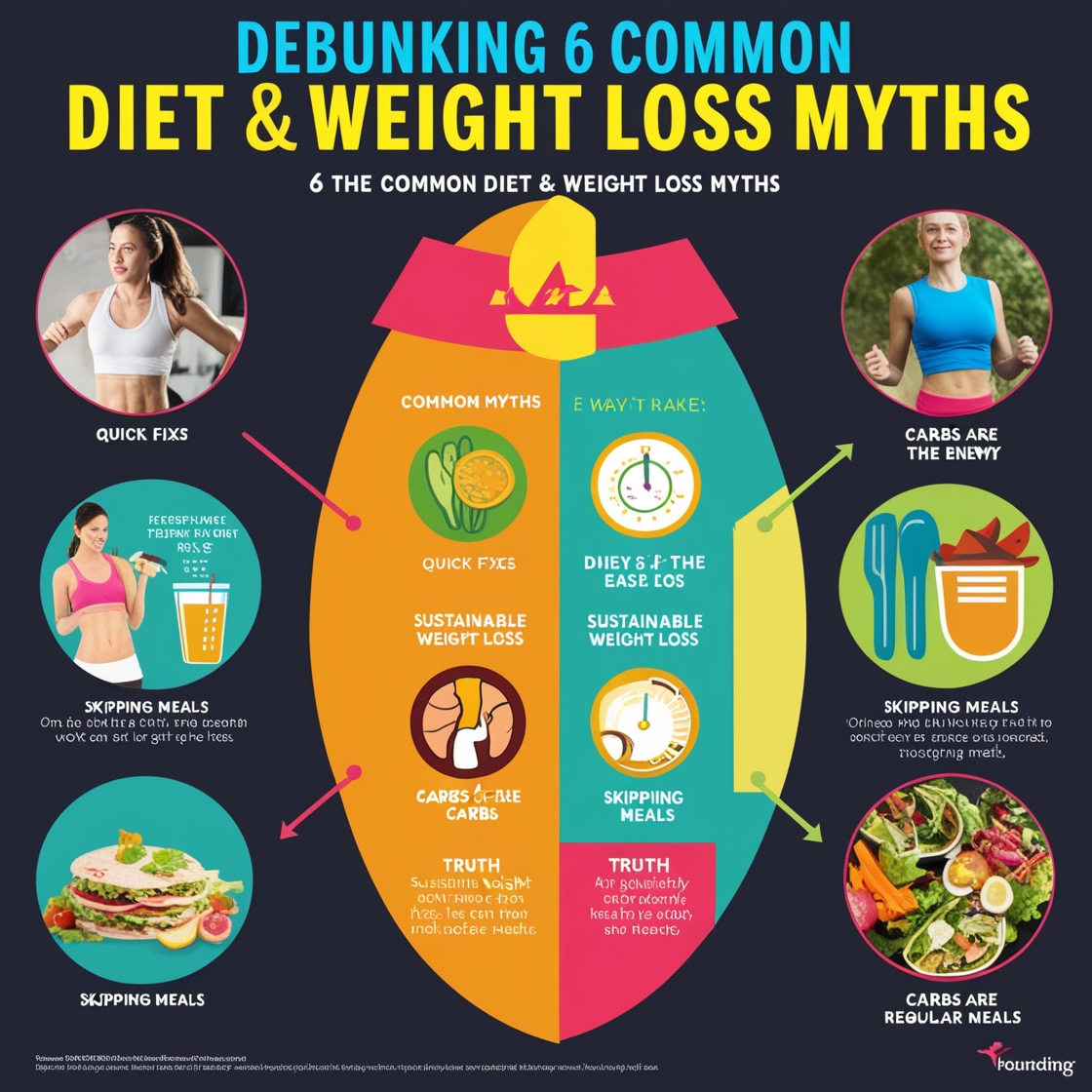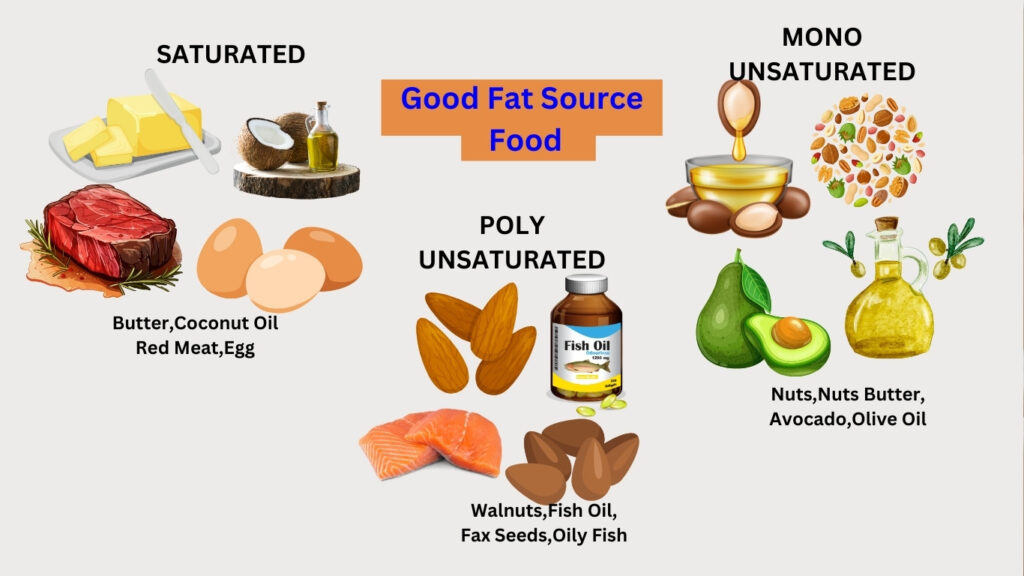Disclosure:
Thank you for reading this post, don't forget to subscribe!
Some of the links on this website are affiliate links. This means that if you click on the link and make a purchase, we may receive a small commission at no extra cost to you. Your support helps us keep the site running.Learn more on my Privacy Policy and Affiliate Disclosure page. Thank you for your support!

In the quest for a healthier lifestyle, many people find themselves bombarded with a myriad of diet and weight loss myths. These myths, often perpetuated by media, well-meaning friends, and sometimes even health professionals, can lead to confusion and frustration. This article aims to demystify some of the most common misconceptions surrounding diet and weight loss, providing you with evidence-based information to help you make informed decisions about your health.
The prevalence of diet myths is staggering, and their impact can be significant. These myths often promise quick fixes and miraculous results, which can be very appealing. However, the reality is that sustainable weight loss requires a balanced approach that considers both diet and lifestyle factors.
The Myth of Quick Fixes
Why Quick Fixes Are Tempting
Quick fixes are alluring because they promise immediate results with minimal effort. In a society where instant gratification is highly valued, the idea of losing weight quickly can be very appealing. Diet pills, detox teas, and extreme diet plans often claim to provide fast results, which can be tempting for those eager to shed pounds.
read next: A Practical 30-Day Weight Loss Plan-Expert Guidance from a Dietitian.
The Reality of Sustainable Weight Loss
Sustainable weight loss, however, is a different story. It requires consistent effort, patience, and a long-term commitment to healthy habits. While quick fixes might show initial results, they are often not maintainable and can lead to a cycle of yo-yo dieting, which is harmful to both physical and mental health. True weight loss comes from making gradual changes to your diet and lifestyle that you can stick with over time.
Carbs are the Enemy
Understanding Carbohydrates
Carbohydrates have been demonized in many popular diets, leading people to believe that they must be avoided at all costs. However, not all carbs are created equal. There are simple carbs, like sugar and refined grains, which can cause spikes in blood sugar levels, and complex carbs, like whole grains and vegetables, which provide sustained energy and essential nutrients.
The Role of Carbs in a Balanced Diet
Carbohydrates are an important part of a balanced diet. They are the body’s main source of energy and play a crucial role in brain function. Rather than eliminating carbs altogether, it is important to focus on consuming healthy, complex carbohydrates that provide fiber and other essential nutrients.

Skipping Meals to Lose Weight
The Concept of Skipping Meals
Many people believe that skipping meals is an effective way to reduce calorie intake and lose weight. This myth is often based on the idea that eating fewer meals will naturally lead to consuming fewer calories.
learn more about: Dispelling nutrition myths-harvard school of public health.
Impact on Metabolism and Overall Health
However, skipping meals can actually have the opposite effect. It can slow down your metabolism, making it harder to lose weight in the long run. Additionally, skipping meals can lead to overeating later in the day, as your body tries to compensate for the missed calories. This can result in poor food choices and a negative impact on your overall health.
All Calories Are Equal
The Concept of Caloric Intake
The idea that all calories are equal is a common misconception. While it is true that weight loss ultimately comes down to consuming fewer calories than you expend, the quality of those calories matters greatly.
Fats Make You Fat
Quality vs. Quantity of Calories
Nutrient-dense foods, like fruits, vegetables, lean proteins, and whole grains, provide essential vitamins and minerals that your body needs to function properly. On the other hand, empty-calorie foods, like sugary snacks and processed foods, provide little to no nutritional value. Focusing on the quality of your calories can help you maintain a healthy weight and improve your overall health.
Different Types of Fats
Fats have long been vilified as the enemy of weight loss. However, not all fats are bad. There are different types of fats, including saturated, unsaturated, and trans fats. While it is important to limit your intake of unhealthy fats, like trans fats, healthy fats are essential for your body.
read more abuout: 10 proven tips for healthier diet-transform your nutrition today.
Importance of Healthy Fats
Healthy fats, like those found in avocados, nuts, and olive oil, play a crucial role in brain function, hormone production, and nutrient absorption. Including these fats in your diet can actually help you feel fuller longer, reducing the likelihood of overeating.

You Have to Eat Less to Lose Weight
The Balance of Caloric Intake and Expenditure
The idea that you have to eat less to lose weight is a simplistic view of weight loss. While it is true that reducing your caloric intake can lead to weight loss, it is important to consider the balance of calories in and calories out.
Importance of Nutrient Density
Eating nutrient-dense foods can help you feel satisfied while still consuming fewer calories. Additionally, regular physical activity is essential for burning calories and maintaining a healthy weight. Rather than simply focusing on eating less, it is important to focus on eating better and staying active.

Real Stories: Experiences with Diet Myths
Personal Narratives
Hearing from others who have struggled with diet myths can be both enlightening and encouraging. Many people have shared their experiences of trying quick fixes, cutting out entire food groups, and skipping meals, only to find that these methods did not lead to sustainable weight loss. Learning from these stories can help you avoid making the same mistakes.
Lessons Learned
The key takeaway from these stories is that there are no shortcuts to achieving and maintaining a healthy weight. It requires a balanced approach that includes healthy eating, regular physical activity, and a positive mindset. By debunking these common diet myths, you can develop a more realistic and sustainable approach to weight loss.
Scientific Insights on Diet Myths
Research Findings
Scientific research has debunked many of the common diet myths that continue to circulate. Studies have shown that quick fixes and extreme diets are not effective in the long term and can even be harmful. Additionally, research has highlighted the importance of a balanced diet that includes a variety of nutrients.
Discover more about: 10 nutrition myths debunked-Mayo clinic.
Expert Opinions
Experts in the field of nutrition and weight loss emphasize the importance of a holistic approach to health. This includes focusing on the quality of your diet, staying active, and making gradual changes that you can maintain over time. By following evidence-based guidelines, you can achieve sustainable weight loss and improve your overall health.
Practical Tips for Healthy Weight Loss
Setting Realistic Goals
One of the most important steps in achieving healthy weight loss is setting realistic goals. This means focusing on small, achievable changes rather than aiming for drastic results. By setting realistic goals, you can build momentum and stay motivated on your weight loss journey.
Developing a Balanced Diet Plan
Creating a balanced diet plan is essential for sustainable weight loss. This means including a variety of foods from all food groups and focusing on nutrient-dense options. It is also important to listen to your body’s hunger and fullness cues and avoid restrictive dieting.
The Role of Exercise in Weight Loss

Combining Diet and Exercise
Exercise plays a crucial role in weight loss and overall health. Combining a healthy diet with regular physical activity can help you achieve your weight loss goals more effectively. It is important to find activities that you enjoy and can stick with in the long term.
Further Reading: Mental Health Matters: Practical Tips for Managing Anxiety and Stress.
Types of Effective Exercises
There are many different types of exercises that can help with weight loss, including cardiovascular exercises, strength training, and flexibility exercises. Finding a balance of these different types of exercise can help you stay motivated and achieve better results.
Psychological Aspects of Weight Loss
The Mental Strain of Dieting
Weight loss is not just a physical challenge; it can also be a mental and emotional one. The pressure to lose weight and the frustration of diet myths can take a toll on your mental health. It is important to approach weight loss with a positive mindset and seek support when needed.
Building a Healthy Relationship with Food
Developing a healthy relationship with food is essential for sustainable weight loss. This means viewing food as fuel for your body rather than something to be feared or restricted. By building a positive relationship with food, you can enjoy a more balanced and healthy lifestyle.

Conclusion
Navigating the world of diet and weight loss can be overwhelming, especially with the plethora of myths that abound. However, by debunking these six common diet and weight loss myths, we can pave the way for healthier, more sustainable habits. Understanding that there are no quick fixes, carbs are not the enemy, skipping meals can be counterproductive, not all calories are equal, fats are essential, and eating less isn’t the only way to lose weight, provides a solid foundation for achieving long-term health goals.
Remember, sustainable weight loss is about balance, moderation, and making informed choices. Embrace a diet rich in nutrient-dense foods, stay active, and cultivate a positive relationship with food. This holistic approach will not only help you reach your weight loss goals but also improve your overall well-being.
Summarizing Key Takeaways
Debunking common diet and weight loss myths is essential for achieving sustainable health goals. By understanding the truth behind these myths, you can develop a more realistic and balanced approach to weight loss. Focus on making gradual changes, setting realistic goals, and building a positive relationship with food and exercise.
explore more from morningscape mindset media:
- Gut Health Decoded: How Your Microbiome Shapes Energy, Mood, and Immunity
- The Science of Stillness: How Doing Nothing Can Heal Your Mind and Body
- Are You a Late-Night Snacker? 5 Possible Reasons Why You Can’t Stop Craving Food at Night
- The Ultimate Fat-Loss + Muscle Retention Blueprint (For Men)
- Smart Biceps Training: A Science-Backed Blueprint for Bigger, Stronger Arms
Frequently Asked Questions
How can I lose weight without quick fixes?
Focus on making gradual changes to your diet and lifestyle, set realistic goals, and maintain a balanced approach that includes regular physical activity and healthy eating.
Are carbohydrates really bad for weight loss
No, carbohydrates are an essential part of a balanced diet. Focus on consuming complex carbohydrates, such as whole grains and vegetables, which provide sustained energy and essential nutrients.
Is skipping meals an effective way to reduce calorie intake?
No, skipping meals can slow down your metabolism and lead to overeating later in the day. It is important to eat regular, balanced meals to support a healthy metabolism and overall health.
Do all calories have the same impact on weight loss?
No, the quality of calories matters. Nutrient-dense foods provide essential vitamins and minerals, while empty-calorie foods offer little nutritional value. Focus on consuming high-quality calories for better health.
Are fats always bad for weight loss?
No, healthy fats are essential for your body and can help you feel fuller longer. Include sources of healthy fats, such as avocados, nuts, and olive oil, in your diet.
Is eating less the only way to lose weight?
No, it is important to balance caloric intake with expenditure and focus on nutrient density. Regular physical activity and a balanced diet are key to sustainable weight loss.
Are you ready to break free from diet myths and start your journey toward a healthier you? Subscribe to our newsletter for more health tips, and motivational article that will keep you inspired. Don’t to follow Us on social media and inspired others on their path to better health. Together, we can debunk these myths and achieve our health goals. Sign up today and take the first step towards a healthier, happier life!
more about:
HEALTH / WELLNESS / FITNESS / NUTRITION
Share this article







